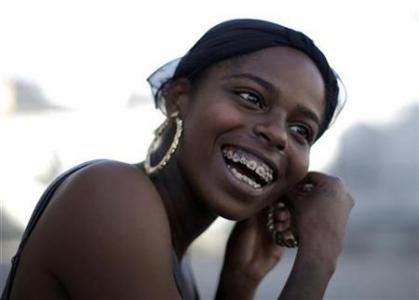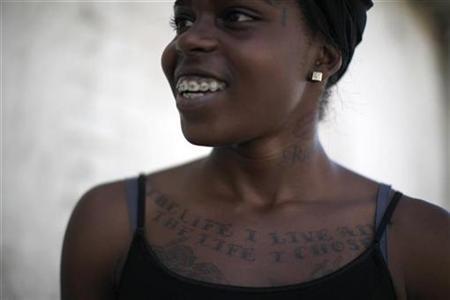|
.........
Homegirl Cafe helps gang members change their lives
A chance to start over
~~~~~~~~~~~~~~~~~~~~~~~~~~~~~~~~~~~~~~~~~~~~~~~~~~~~~~~~~~~~~~~~~~~~~~~~~~~~~~~~~~~~~
 |

Homegirl Cafe waitress Stephanie Lane, 21 |
|
Homegirl Cafe helps gang members change their lives
A chance to start over
October 27, 2010
Reuters
It was Stephanie Lane's first day on the job as a waitress at Homegirl Cafe and the last thing she wanted to do was wait on the police.
The restaurant, staffed by female gang members trying to leave their past behind, is part of Homeboy Industries, the largest gang intervention program and one of the most successful in the United States.
Quitting a life of drug dealing, fighting and stealing cars on the streets of South Los Angeles, where she followed her father and mother into the Crips gang, was not easy. Lane faced the first of many tests when the police chief and top brass were growing impatient waiting for service in the cafe. |
|
"No girls wanted to take their order," Lane said. "They're the reason all of us have been through what we've been through."
Lane glowered as she approached the table. She knew they'd be looking at her tattoos, sizing her up. She trained her eyes on her pad as she took their drink order. A hand suddenly grabbed her arm and the chief was looking at her.
He told her to smile. When she asked why he said because he wanted a cup of coffee.
Two and a half years later, Lane, 21, smiles broadly as she recounts the story, masking her struggles.
The journey to set her life straight illustrates the difficulty of leaving gang life behind. She has been in fights, sent back to prison and gunned down. Each time, she returned to the cafe.
Father Gregory Boyle founded Homeboy two decades ago after working in a Roman Catholic parish caught in the middle of gang wars that were fueled in part by the crack cocaine epidemic. The program now provides employment, tattoo-removal, education, and mental health and legal counseling to around 15,000 people a year.
Lane grew up near Boyle's parish and he has known her since she was a child.
"We had shootings morning, noon, and night," Boyle recalled. "She was in the generation that had a lot of babies who were placed by their mothers in bathtubs to avoid the bullets that would fly through the windows at night. It was a war zone."
Both her parents were gang members. Even as a little girl, Lane couldn't wear red because it was the color of the rival Bloods gang.
At age 11 she asked to join her parents in the East Coast Crips, a branch of one of the largest and most violent gangs. |
"Growing up with my mother and father both being gang members and drug dealers, I was around a lot of money. I was always around guns. I was always around drugs. I was always around people getting drunk, or somebody getting beaten up," she said. "Everything my dad did, everything my mother did, I always wanted to do better."
The price of her devotion was repeated stints behind bars, starting at age of 13. During her last sentence in a juvenile lockup, Boyle wrote a letter on her behalf that helped reduce her sentence. He offered her job at the cafe.
"When I first came to Homeboys it was hard," she said. "There were Hispanics, there were blacks and Chinese gangs, and all of us have to work together. I saw my enemies from different hoods, I saw girls I'd fought in jail and I thought: I'm not going to be able to do this."
Learning to take orders from people and accept criticism was a challenge. She cussed at one of her bosses and challenged her to a fight. When work ended, she'd return to her old neighborhood, hang around with her fellow gangbangers and get in fights. One night she was shot three times.
Boyle turned up at the hospital with managers and waitresses from Homegirl Cafe.
. |
|
 |
"She just burst into tears when I told her who was outside," he said.
It was then that she realized things had to change.
"Either I'm going back to jail or I have to switch the way I'm living," she said.
Since recovering from her wounds, she's taken up boxing to channel her anger, waking up early to run each day and training with a coach on weekends.
"Now I look at gangs differently," she explained. "Now I feel like I've got too much to lose. Boxing keeps my head on straight and gets me back in shape. So I'm straight and I like it."
Lane hopes to go into restaurant management. She has started an internship at Ciudad, an upscale restaurant in Los Angeles. She writes grant proposals for Homegirl Cafe's organic garden, and is a favorite amongst the regulars there.
After her initial encounter with former Police Chief William Bratton, she waited on him every Tuesday morning. |
|
|
|
 |

|